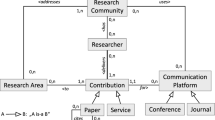Abstract
The design of the database is crucial to the process of designing almost any Information System (IS) and involves two clearly identifiable key concepts: schema and data model, the latter allowing us to define the former. Nevertheless, the term “model” is commonly applied indistinctly to both, the confusion arising from the fact that in Software Engineering (SE), unlike in formal or empirical sciences, the notion of “model” has a double meaning of which we are not always aware. If we take our idea of “model” directly from empirical sciences, then the schema of a database would actually be a model, whereas the data model would be a set of tools allowing us to define such a schema.
The present paper discusses the meaning of “model” in the area of Software Engineering from a philosophical point of view, an important topic for the confusion arising directly affects other debates where “model” is a key concept. We would also suggest that the need for a philosophical discussion on the concept of data model is a further argument in favour of institutionalizing a new area of knowledge, which could be called: “Philosophy of Engineering”.
Similar content being viewed by others
References
Aracil J. Introducciòn a la dinámica de sistermóe. Alianza editorial S. A. Hadrid, 1986.
Abramsky S, Gabbay DM, Maibaum TSE. Handbook of Logic in Computer Science. Oxford: Clarendon Press, 1999.
Balzer W, Sneed JD, y Moulines CU. An Achitectonic for Science. Dordrecht: Reidel, 1987.
Black M. Models and Metaphors: Studies in Language and Philosophy. Ithaca: Cornell University Press, 1962.
Blum BI (ed). Beyond Programming: To a New Era of Design. Oxford: Oxford University Press, 1996.
Bourque P, Dupuis R, Abran A, Moore JW, Tripp L (eds). Knowledge Area Description Specification for the Stone Man Version of the Guide to the Software Engineering Body of Knowledge, Version 0.1.Working paper available in www.swebok.org, February, 1999.
Brodie ML, Mylopoulos J, Schmidt JW (eds). On Conceptual Modelling. Perpectives fromArtificial Intelligence, Databases and Programming Languages. Berlin: Springer-Verlag, 1984.
Chang CC, Keisler HJ. Model Theory. North Holland: Netherlands (Amsterdam) 1990.
Connolly B, Strachan. Database Systems. A Practical Approach to Design, Implementation y Management. Addison-Wesley, England, 1999.
De Marco. Controlling Software Projects. NewYork: Yourdon Press, 1982.
Dittrich K. Object-oriented data model concepts. In: Dogac A, Özsu MT, Biliris A, and Sellis T, eds. Advances in Object-Oriented Database Systems. Proceedings of the NATO Advanced Study Institute on Object-Oriented Database Systems, 1993. Berlin: Springer-Verlag, 1994:30–45.
Estany A. Introducción a la Filosofía de la Ciencia. Barcelona: Crítica, 1993.
García Pelayo. La teoría General e Sistemas. Revista de Occidente, 3rd period. 2. Madrid, 1975.
Giere R. Explaining Science: A cognitive Approach. Chicago: University of Chicago Press, 1988.
Hesse M. Models and Analogies in Science. Notre Dame, IN: University of Notre Dame Press, 1966.
Hodges W. Model Theory. Cambridge: Cambridge University Press, 1993.
Khazanchi D, Munkvold BE. “Is Information Systems a Science?” In: Kimble LByC, ed. Information Systems—The Next Generation. Proceedings of the 4th UKAIS Conference. McGraw-Hill, 1999:1–12
Manzano, N. “Teorla de modelos.” Alianza Editorial. Barcelona, 1989.
Marcos A. The tension between aristotle's theories and uses of metaphor. Studies in History and Philosophy of Science 1997;28:123–139.
Marcos E, Marcos A. An aristotelian approach to methodological research:Amethod for data model construction. In: Kimble LByC, ed. Information Systems—The Next Generation. Proceedings of the 4th UKAIS Conference. McGraw-Hill, England, 1999; 532–543.
Müller G, Lenski W. Ω-Bibliography of Mathematical Logic, vol. III: Model Theory. Heidelberg: Springer-Verlag, 1987.
Ortega y Gasset J. La rebelión de las masas. Editorial Revista de Occidente, Madrid, 1930.
Rochfeld A. OOM: Évolution de MERISE vers une approche object. Journées AFCET Ingénierie des bases de données, France, 1992.
Sanders GL. Data Modelling. MA: Boyd & Fraser Publishing company, 1995.
Saraswat P, College B. A historical perspective on the philosophical foundations of information systems. In: Foundation of Information Systems: Toward a Philosophy of Information Technology, November, 1998.
Suppe F. The Semantic Conception of Theories and Scientific Realism. Urbana Il: Illinois University Press, 1989.
Suppes P. A comparison of the meaning and uses of models in mathematics and empirical sciences. Synthese 1960;12.
Taivalsaari. Classes versus prototypes: Some philosophical and historical observations. Journal of Object-Oriented Programming 1997;10(7):44–50.
Tsichritzis DC, Lochovsky FH. Data Models. Englewood Clifs, NJ: Prectice-Hall Inc., 1982.
Author information
Authors and Affiliations
Rights and permissions
About this article
Cite this article
Marcos, E., Marcos, A. A Philosophical Approach to the Concept of Data Model: Is a Data Model, in Fact, a Model?. Information Systems Frontiers 3, 267–274 (2001). https://doi.org/10.1023/A:1011460711754
Issue Date:
DOI: https://doi.org/10.1023/A:1011460711754




